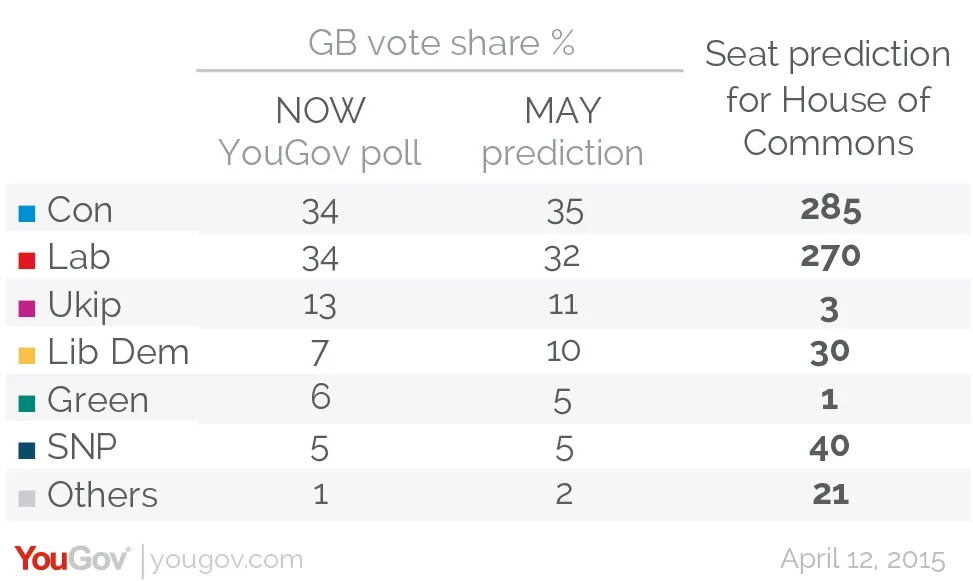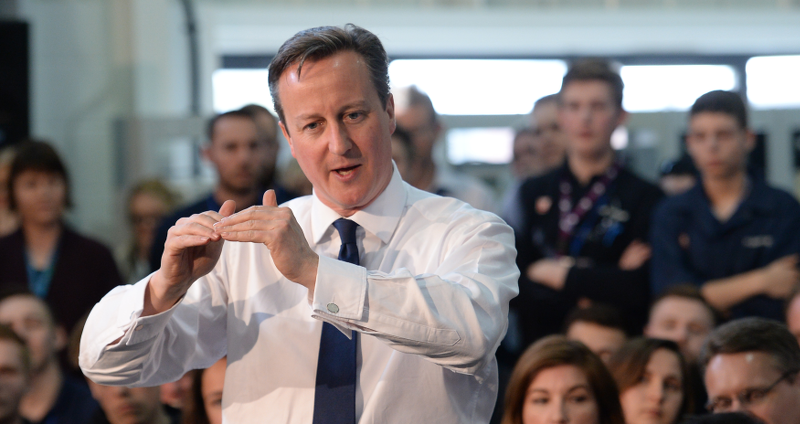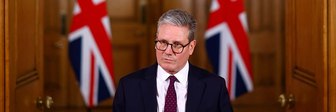The new forecast takes account of Labour’s parlous prospects in Scotland – and the Tory failure to make progress in the rest of Britain

Both Labour and the Conservatives have suffered setbacks to their election hopes. Labour has fallen further behind the SNP in Scotland when it was hoping to start closing the gap; and the Tories have failed to achieve “crossover” – a consistent lead in the polls which they had hoped to secure by Easter week. Unless things change in the next 25 days, neither party will find it easy to form a viable government after the election.
Making sense of state of play is not easy. On Thursday afternoon, three polls generated excitement when they reported Labour leads of up to 6%. A few hours later, two other polls showed the Conservatives one point ahead. On these occasions it is worth bearing in mind that all conventional polls are subject to a margin of error, of 3-4 points per party and 5-6 points on the gap between Labour and Tory. Taking that into account, all five of Thursday’s polls were consistent with a neck-and-neck race.
In fact, it has been neck-and-neck for six months. In order to achieve greater accuracy and minimise sampling fluctuations, YouGov has changed its methods for the final month of the campaign. Our starting point is the pool of more than 100,000 people we questioned in January and February. At the time we found an average Labour lead of less than 1%. So did an average of 54 polls conducted by other companies, even though individual surveys varied between a Labour lead of 7% and a Tory lead of 4%.
Starting last week, YouGov has been requestioning separate samples of at least 1,600 voters drawn from that initial 100,000-strong pool. This allows us to compare what they told us some weeks ago with what they say now. As a result we can be confident that any marked deviation from neck-and-neck will be real, and not a sampling wobble.
We have found no such deviation. All five polls that YouGov has conducted on our new system have had both Labour and Conservative within one point of today’s figures of 34% each. This is not because voters are all stick to their views. Beneath the surface, we find a lot of churn. Around 9% of voters have switched parties since the new year, while another 9% have moved to our from the ranks of the “don’t knows”. However, these changes have largely cancelled each other out.
There are two significant exceptions. Ukip has lost around 300,000 votes to the Conservatives, while Labour has captured a similar number from the Greens. Thus Labour and the Tories remain in lock-step, but both with slightly more support than some weeks ago.
My new forecast takes account of Labour’s parlous prospects in Scotland, and the Tory failure to make progress in the rest of Britain. I still expect a small shift to the Conservatives towards the end of the campaign, but have trimmed their predicted election-day lead in the popular vote from 5% last month to 3% today.
On this projection, it is unclear who would be Prime Minister when the dust settles. The Tories would be the largest party; but even with the help of around ten unionist MPs from Northern Ireland, would still be well short of 300 seats. If David Cameron were to seek approval for a Queen’s Speech, he could be outvoted if Labour and the SNP, with 310 seats together, joined forces. The 30 Lib Dem MPs would be decisive.
Things could change. Our “churn” figures suggest that in each of the battleground seats that will decide the election, 4,000 voters might switch sides between now and election day, and another 4,000 hover been voting and abstaining. To break the deadlock, parties must make sure that these shifts do not simply cancel each other out.
Labour’s task remains to establish its credentials for economic competence, and to boost Ed Miliband’s reputation which, though still poor, has been improving steadily week by week.
Our latest poll shows not only that most voters think the Conservatives’ personal attack on Miliband and Trident was mistaken; the spat has caused a sharp increase in the number of voters who are repelled by Conservative tactics.
This commentary appeared first in the Sunday Times










